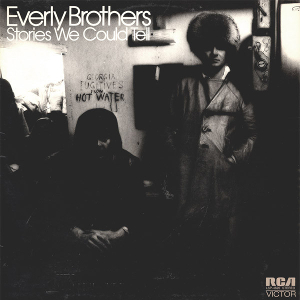See also
- Stories We Tell , a 2012 Canadian documentary film by Sarah Polley
Stories We Could Tell is a 1972 studio album by The Everly Brothers.
Stories We Could Tell may also refer to:

Maurice Ernest Gibb was a British musician, singer, songwriter and record producer who achieved fame as a member of the Bee Gees. Although his elder brother Barry Gibb and fraternal twin brother Robin Gibb were the group's main lead singers, most of their albums included at least one or two songs featuring Maurice's lead vocals, including "Lay It on Me", "Country Woman" and "On Time". The Bee Gees were one of the most successful pop-rock groups of all time.
Green River may refer to:

The Monty Python Instant Record Collection is the title of two compilation albums by the Monty Python troupe. The first was released in the UK and Canada in 1977 and drew from the group's first three studio albums, first live album, and first soundtrack album on the Charisma label, while the second was released in the US in 1981 and comprised tracks from their four albums released on the Arista label. Billed as "the pick of the best of some recently repeated Python hits again, Vol. II", the record sleeve was designed by Terry Gilliam. The UK/Canadian version originally featured packaging that folded out into a cardboard box resembling a large stack of record albums. An inner sleeve featured a spoof "Where Are They Now?" update on the members of the Python team.

Stories We Could Tell is a country rock album by The Everly Brothers, released in 1972. It was reissued as Stories We Could Tell:The RCA Years by BMG in 2003 and included additional tracks, all stemming from the successor album Pass the Chicken & Listen. In 2014 it was re-released once more on Stories We Could Tell + Pass The Chicken & Listen by Morello Records.
Show, don't tell is a technique used in various kinds of texts to allow the reader to experience the story through actions, words, thoughts, senses, and feelings rather than through the author's exposition, summarization, and description. It avoids adjectives describing the author's analysis, but instead describes the scene in such a way that readers can draw their own conclusions. The technique applies equally to nonfiction and all forms of fiction, literature including haiku and Imagism poetry in particular, speech, movie making, and playwriting.
A liar is a person who tells lies.
References to George Orwell's 1949 dystopian political novel Nineteen Eighty-Four themes, concepts and plot elements are also frequent in other works, particularly popular music and video entertainment.
Only Human may refer to:

The Price, published by Eclipse Comics, is a Dreadstar graphic novel by Jim Starlin featuring Syzygy Darklock. It is the second part of the Metamorphosis Odyssey story arc begun in Epic Illustrated magazine and tells the story of the magician-priest Darklock and his rise to power within the Church of the Instrumentality.
The Greatest Story Ever Told is a 1965 film based on
"Orange Blossom Special" is a fiddle tune about a luxury passenger train of the same name. The song was written by Ervin T. Rouse (1917–1981) in 1938 and was first recorded by Rouse and his brother Gordon in 1939. Often called simply "The Special" or "OBS", the song is commonly referred to as "the fiddle player's national anthem".

Stories We Could Tell: The RCA Years is a country rock compilation album by The Everly Brothers, released in 2003. The original LP Stories We Could Tell was produced by Paul Rothchild and released by RCA Victor in 1972. This CD contains the original album plus eight of the twelve tracks from the Everlys' other RCA album, Pass the Chicken & Listen.

Pass the Chicken & Listen is a country rock album by The Everly Brothers, released in 1972. It was the last studio recording the brothers made for over 10 years.
Band of Brothers may refer to:

Nineteen Eighty-Four is a dystopian social science fiction novel and cautionary tale written by English writer George Orwell. It was published on 8 June 1949 by Secker & Warburg as Orwell's ninth and final book completed in his lifetime. Thematically, it centres on the consequences of totalitarianism, mass surveillance and repressive regimentation of people and behaviours within society. Orwell, a democratic socialist, modelled the totalitarian government in the novel after Stalinist Russia and Nazi Germany. More broadly, the novel examines the role of truth and facts within politics and the ways in which they are manipulated.

The Emptiness is the third studio album by American metalcore band Alesana. It was recorded in the fall of 2009 and was released on January 26, 2010 through Fearless Records. The album is considered a rock opera due to its in-depth story. Vocalists Shawn Milke and Dennis Lee have both stated that the idea of writing an album based upon their own authored story has been present with them since the time of the band's first release, Try This with Your Eyes Closed.
Rededjet is the name of a fictitious ancient Egyptian woman appearing as the heroic character in a story told in the legendary Westcar Papyrus. She is said to have fulfilled a prophecy by giving birth to three future kings that was forecast during the reign of Khufu by a magician named Dedi.

"Mandolin Wind" is a song written by Rod Stewart. It was first released on Stewart's 1971 album Every Picture Tells a Story and later as the b-side of a single from that album, his version of "(I Know) I'm Losing You." In 1972, it was recorded by The Everly Brothers on their album Stories We Could Tell, and in 1977 it was recorded by Earl Scruggs on his album Strike Anywhere. The song has also appeared on numerous Rod Stewart compilation and live albums, including Sing It Again Rod, Storyteller – The Complete Anthology: 1964–1990 and Unplugged...and Seated. It has also appeared on Everly Brothers and Earl Scruggs compilation albums.
Up in Mabel's Room may refer to:

"True Love" is a song by British rock band Coldplay for their sixth studio album Ghost Stories, where it appears as the fourth track. It was released by Parlophone as the album's third single on 14 August 2014. The band co-produced the track with Paul Epworth, Daniel Green and Rik Simpson, while American record producer Timbaland provided additional drums.